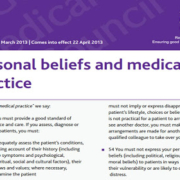Brain death, resurrection, and Archie Battersbee
 Since June, when I last wrote about the deeply distressing case of Archie Battersbee, his ventilator was eventually switched off on 4 August. Soon after, he was declared dead when his heart subsequently stopped beating. In the evidence they gave at the court hearing on 6-8 June, the healthcare professionals caring for Archie all agreed that he was already irreversibly into the dying process by the time his brain scans were taken on 31st May. These scans prompted Justice Arbuthnot to declare Archie dead (Paragraphs 85-95) back in her June judgement. The subsequent Appeal Court decision determined, however, that the case should go back to the High Court. The final ruling by Justice Hayden to allow withdrawal of ventilation from Archie was subsequently made on the basis that even on the assumption that he were still alive, continuation of medical intervention was not ‘in his best interests.’
Since June, when I last wrote about the deeply distressing case of Archie Battersbee, his ventilator was eventually switched off on 4 August. Soon after, he was declared dead when his heart subsequently stopped beating. In the evidence they gave at the court hearing on 6-8 June, the healthcare professionals caring for Archie all agreed that he was already irreversibly into the dying process by the time his brain scans were taken on 31st May. These scans prompted Justice Arbuthnot to declare Archie dead (Paragraphs 85-95) back in her June judgement. The subsequent Appeal Court decision determined, however, that the case should go back to the High Court. The final ruling by Justice Hayden to allow withdrawal of ventilation from Archie was subsequently made on the basis that even on the assumption that he were still alive, continuation of medical intervention was not ‘in his best interests.’
What lessons can be learned from this tragic sequence of events to try and prevent other families from going through a similar protracted agony?
One of the most striking incidents noted in Justice Arbuthnot’s ruling was that within three days of Archie’s admission, his parents were approached to obtain consent to eventually harvest his organs for donation after his death (Para 100). This was at a time when his parents still believed he would recover. The timing of requests for deceased donations is absolutely crucial. This approach to Archie’s parents appears highly inappropriate since they did not even accept their son was dying. The ill-judged request may well have been a major factor in perpetuating the parents’ impression that the hospital intended to end Archie’s life prematurely.
The public was also being encouraged to pray for Archie’s full recovery, even after it was clear from the June judgment that his brain stem was coning – ‘a very reliable marker for a point-of-no-return for brain stem function’ (Paragraph 68). Many of his other organs were also failing from the lack of integrative functioning of Archie’s brain. From the deteriorating serial brain scans, Archie was clearly considered to be brain stem dead by the consultants caring for him and those approached for a second opinion. However, in Archie’s case, they could not formally meet the strict criteria to declare him brain stem dead since they could not perform all the necessary tests (Paragraph 24). At this stage, however, it seems to me that the miracle Archie needed to recover was one of resurrection rather than healing.
Clearly, God is as able to resurrect the dead as to heal the sick but nowhere does the Bible instruct the people of God to pray for the resurrection of others back to this earthly life. In the Old Testament, the three examples of raising from the dead are sovereign acts of God mediated through his appointed prophets, none of which were preceded by the prayers of their family and friends.
Even in the case of the widow of Zarephath’s son, she did not expect to see him alive again, let alone request such a thing from Elijah – indeed, she implicitly blamed Elijah for the boy’s death (1 Kings 17:17-24). As God’s anointed prophet, Elijah alone took the initiative and cried to the Lord to raise the boy to life.
The Shunammite woman did go straight to find Elisha when her son suddenly died from an intracranial catastrophe, but she did not ask for the boy’s resurrection. Indeed, her words to Elisha seem to be a rebuke to the prophet. It was Elisha himself who took the initiative, including prayer to the Lord, which led to the boy’s resurrection (2 Kings 4:18-37).
After Elisha’s death, neither the man thrown into his tomb nor those who threw him there expected him to be resurrected. (2 Kings 13:20–21)
Likewise, in the three accounts of Jesus raising the dead – namely the widow of Nain’s son (Luke 7:11-17), Jairus’ daughter (Luke 8:40-56), and Jesus’ friend, Lazarus (John 11:1-44), it was Jesus alone who took the initiative in commanding these resurrections. In the latter two cases, he was rebuked or mocked by the mourners for arriving too late to heal the person concerned, rather than them expecting Jesus to raise the one being mourned. Finally, in both the resurrection of Tabitha by Peter (Acts 9:36-42) and that of Eutychus by Paul (Acts 20:7-12), there is no mention of the crowd praying to the Lord for resurrection nor requests to either apostle to do so. Peter prays and then speaks the words of resurrection over Tabitha, while Paul simply takes Eutychus into his arms and declares that ‘life is in him.’
Even in the Bible, then, resurrection to this life is not the norm. Only nine individual resurrections are recorded in total, including that of Jesus himself. Where, then, is the biblical precedent for encouraging believers to pray for the resurrection of a loved one over a protracted period of several months?
With the exception of Christ, all those in Scripture recorded as resurrected subsequently died again. The resurrection to eternal life, however, is a gate open to all who trust in Christ. The emphasis on Archie’s restoration to this life rather than focusing on the joy that awaits in the next for every believer surely risks reversing biblical priorities? Of course, we are not to seek death for our loved ones or ourselves. But when it is imminent, neither are we to be overwhelmed by death. We grieve for sure – for grief is the price of love, but we are not left without hope; rather, we have the certainty that the best is yet to come and our loved ones in Christ will be there with him to welcome us when we too enter our eternal home (Luke 16:9b).
The concept and diagnosis of brain death are both difficult to understand and accept when the ventilated patient appears so alive. Perhaps Christian healthcare professionals should do more to educate pastors and congregations alike about brain death and some of the more distressing elements of circulatory death in hospital when donation is being considered? Trust that the very best possible treatment is being given to a loved one is crucial both for the patient and for the grieving relatives. To have any lingering doubts that everything possible was done to save one’s child is a terrible legacy for any grieving parent.












Leave a Reply
Want to join the discussion?Feel free to contribute!